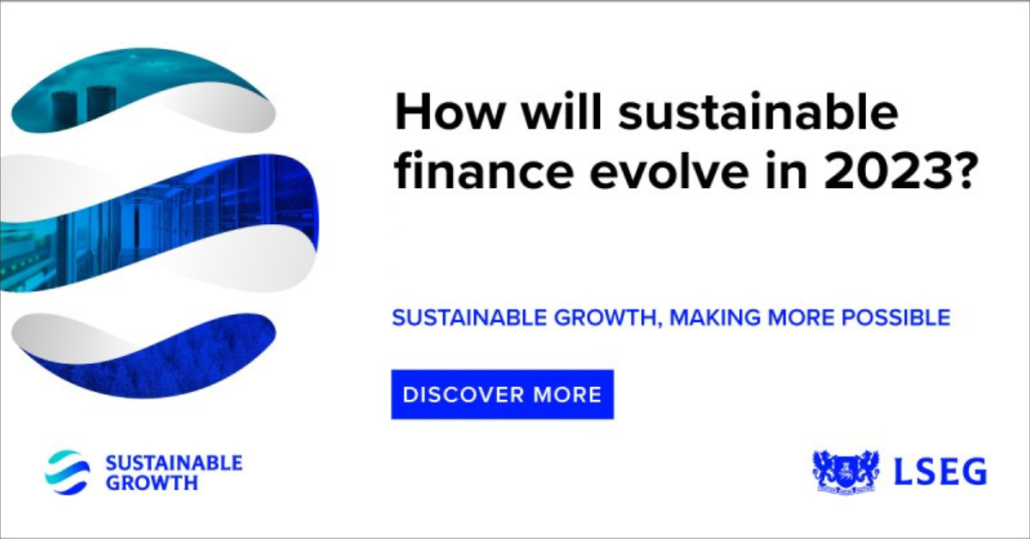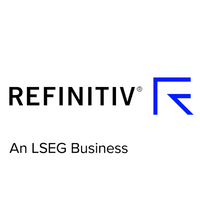How will sustainable finance evolve in 2023?
By Refinitiv
09-03-2023 | treasuryXL | Refinitiv | LinkedIn |
With 2023 gearing up to be a momentous year for sustainable finance, this blog explores the key topics that will help to shape the industry now and into the future.

- What are the five topics that could shape the sustainable finance agenda in 2023 and beyond?
- Regulation, wider climate considerations and greenwashing will be highly scrutinised.
- Data will continue to be a vital part of the world’s sustainable finance journey.
For more data-driven insights in your Inbox, subscribe to the Refinitiv Perspectives weekly newsletter.
LSEG is dedicated to tackling the world’s urgent challenges and enabling sustainable growth for economies globally. That’s why we are focused on the permanent fusion of sustainability and finance and are kicking off 2023 with a view on a few topics which will shape the sustainable finance agenda next year:
Complexity – before it gets better, it will get worse
Sustainable finance regulation, disclosure standards and guidelines, fragmented initiatives and the definitions used are continuously evolving.
We have spoken at length about the importance of convergence in this highly fragmented space, and there are a number of promising developments. However, I expect that it will take some time before we get to the bottom of this problem and can simplify it in the context of the financial sector.
Recommendation: ISSB, SEC and EU policymakers should align their guiding principles and metrics as well as their digital tagging efforts on sustainability disclosure rules.
Learn more about how LSEG can help in your search for sustainable growth
Nature will enter the boardroom – the new elephant in the room
It is estimated that half of the world’s GDP is dependent on natural capital. But hardly any of these costs are included in financial accounting, risk management or business valuations.
Furthermore, the climate crisis cannot be solved without nature.
Biodiversity has long been ignored by capital markets. However, this is now history, and the topic is becoming the centre of attention in sustainable finance due to the global agreement reached in Montreal at COP15.
I expect to see an acceleration around defining nature KPIs and disclosure requirements, and increasing pressure for greater data availability, to make nature-themed financial products and solutions more common.
Recommendation: the TNFD final recommendations that are expected in September 2023 and the ISSB alignment with TNFD and the collaboration with insurance companies will speed up solving the nature data challenge.
The cost of decarbonisation – how high is the bill?
Currently, many businesses have little knowledge about the cost of decarbonisation. When it comes to achieving their net-zero goals, many players are yet to measure and quantify the price tag.
Next year, sizing and pricing the decarbonisation of a business will be at the top of the agenda as challenges such as energy costs will still be relevant.
Recommendation: combine costs with benefits both short-term and long-term to see the complete picture. Price on carbon is a must-have in the future.
Re-evaluate claims, terminology and labels – if you cannot prove it, you should not say it
Political and litigation risks are forcing businesses to re-evaluate their ESG claims, product labels and public statements.
Whether it is about classifying funds as Article 6, 8 or 9, being a member of the NZAOA, or calling an investment strategy ESG, the financial industry is walking a very fine line that is not clearly defined, making it an essential but also risky business to be in.
Recommendation: global definitions, terms and transparency.
Transition finance – accelerating decarbonisation
As the world begins to fully understand the cost of nature and climate change, large amounts of transition finance is required to accelerate decarbonisation and robust transition plan activation.
Sustainability-linked bonds and transition bonds are growing significantly in the EU and China, which reopens the debate on the need to introduce transition taxonomies.
Recommendation: promote clear transition plan guidance that focuses on disclosure templates enabling data standardisation.
At LSEG, we believe only the permanent fusion of finance and sustainability will help effectively tackle the world’s most urgent challenges and strategically enable sustainable growth.
Learn more about how LSEG can help in your search for sustainable growth



